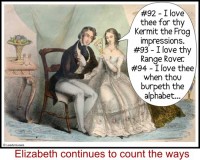
How Do I REALLY Love Thee?
The Married Woman's Guide to Counting the Ways
 Nobody had to tell me that Elizabeth Barrett wrote her famous poem "How Do I Love Thee?” to Robert Browning before she married him. Once she started counting the ways, it was a dead giveaway. Don't get me wrong. It's a lovely poem, and I'm sure she meant every word she said. After all, Liz was absolutely crazy about Bob. Everybody knows that. All I'm saying is that there was just something about the way she expressed her feelings that just didn't sound "wifey”, if you get my drift.
Nobody had to tell me that Elizabeth Barrett wrote her famous poem "How Do I Love Thee?” to Robert Browning before she married him. Once she started counting the ways, it was a dead giveaway. Don't get me wrong. It's a lovely poem, and I'm sure she meant every word she said. After all, Liz was absolutely crazy about Bob. Everybody knows that. All I'm saying is that there was just something about the way she expressed her feelings that just didn't sound "wifey”, if you get my drift.
Take all that business about depth and breadth and height, for instance. Now I've been married for more than thirty-nine years I can't recall a single occasion when I used depth, breadth and height to measure the reach of my soul. The dimensions of a UPS package maybe, but never the reach of my soul.
And then there's the part about "feeling out of sight For the ends of Being and ideal Grace.” Aside from the fact that I have no clue what that means, I'm fairly certain I've never spoken that phrase to my husband once.
To me the whole problem boils down to experience. Or lack of it. Like I said, I'm sure Elizabeth was sincere in her feelings about Robert, but let's face it, at the time she wrote that poem the only thing she had to go on was a warm, squishy feeling inside whenever he held her hand, and the way her knees buckled every time his beard tickled her chin. No wonder she loved him "purely” and "freely.” Who wouldn't?
Of course I'm not suggesting for one minute that getting married marks the end of passion. Far from it! The same things that first attracted me to my husband umpty-million decades ago still captivate me today. I love his quick wit, his tender heart and his hairy chest (although he'd probably be horrified I told you, so if you happen to run into him in town, don't let on.) Being a wife doesn't mean the end of the romance. It just means that in addition to all to the misty, violins-in-the-background stuff, I now have a lot of other ways to measure my love as well.
In my case there are the thoughtful gestures my husband makes every day. As I mentioned earlier, I've been married for thirty-nine years and to this day I have never once opened my own car door. No brag, just fact. (Well, maybe a little brag…) He also washes my reading glasses and leaves them beside the bathroom sink every morning, and he saves me the brownies from the middle of the pan because he knows I don't like the ones with the crunchy edges.
But in order for passion to thrive, the gestures need to go both ways. For me it helps to look at the title of the poem, "How Do I Love Thee?” and remember that "love” is a verb. One way I do that is to make my husband's tunafish with dill pickle relish because that's how he likes it (even though you and I both know the only decent tunafish is made with sweet relish.) I also fold his dress shirts a certain way when he packs for a business trip, so they won't look like he pulled them out of a toilet paper spindle. Oh, and one more thing – I always sit with my back to the door when we eat out at a restaurant. Don't ask me to explain this one, but for some reason guys just have this thing about facing the door. I think it has something to do with Billy the Kid. Or is it Billie Holliday? I forget which.
Anyway, my point is, soft, sentimental words are a delightful way to describe a newfound romance, but it's the stuff that comes after "I do” that is the true measure of love. I say give Elizabeth a few thousand days of married life, splitting the last piece of pecan pie, finishing each other's jokes, and arguing over whose fault it was that the VISA bill wasn't mailed on time. Then when she sits down to write Robert a poem called, "How Do I Love Thee?” and she ends up counting the ways with soft brownies and folded shirts and clean glasses, with car doors and backward chairs and tunafish, you can bet she really knows what it means to love him to the depth and breadth and height her soul can reach.
- Search for Husband articles similar to "How Do I REALLY Love Thee?.
- Search all articles similar to "How Do I REALLY Love Thee?".
- List all Husband articles.
Terms & Conditions | Contact | Login | This website designed by Shawn Olson